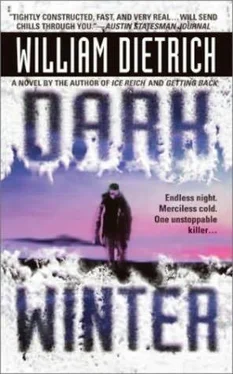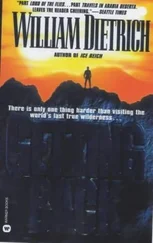William Dietrich - Dark Winter
Здесь есть возможность читать онлайн «William Dietrich - Dark Winter» весь текст электронной книги совершенно бесплатно (целиком полную версию без сокращений). В некоторых случаях можно слушать аудио, скачать через торрент в формате fb2 и присутствует краткое содержание. Жанр: Триллер, на английском языке. Описание произведения, (предисловие) а так же отзывы посетителей доступны на портале библиотеки ЛибКат.
- Название:Dark Winter
- Автор:
- Жанр:
- Год:неизвестен
- ISBN:нет данных
- Рейтинг книги:3 / 5. Голосов: 1
-
Избранное:Добавить в избранное
- Отзывы:
-
Ваша оценка:
- 60
- 1
- 2
- 3
- 4
- 5
Dark Winter: краткое содержание, описание и аннотация
Предлагаем к чтению аннотацию, описание, краткое содержание или предисловие (зависит от того, что написал сам автор книги «Dark Winter»). Если вы не нашли необходимую информацию о книге — напишите в комментариях, мы постараемся отыскать её.
Dark Winter — читать онлайн бесплатно полную книгу (весь текст) целиком
Ниже представлен текст книги, разбитый по страницам. Система сохранения места последней прочитанной страницы, позволяет с удобством читать онлайн бесплатно книгу «Dark Winter», без необходимости каждый раз заново искать на чём Вы остановились. Поставьте закладку, и сможете в любой момент перейти на страницу, на которой закончили чтение.
Интервал:
Закладка:
William Dietrich
Dark Winter
STATION ROSTER
The Beakers
Mickey Moss: astrophysics
Harrison Adams: astronomer
Carl Mendoza: astronomer
Gina Brindisi: astronomy post-doc
Dana Andrews: atmospheric science
Gerald Follett: atmospheric science
Hiro Sakura: magnetic fields
Alexi Molotov: aurora australis
Jed Lewis: meteorology
Lena Jindrova: botanist
Eleanor Chen: science technician
Robert Norse: psychologist
Station Support
Rod Cameron: station manager
Nancy Hodge: medic
Abby Dixon: computers
Doug "Pika" Taylor: generators
Wade "Cueball" Pulaski: cook
Jimmy "Buck" Tyson: vehicle mechanic
Gabriella Reid: berthing and administration
Linda Brown: logistics and galley
George Geller: maintenance
Steve Calhoun: carpenter
Hank Anderson: carpenter
Charles Longfellow: electrician
Gage Perlin: plumber
Clyde Skinner: radio and communications
CHAPTER ONE
Sometimes you have to go into nothing to get what you want.
That was the Jed Lewis theory, anyway. West Texas oil patch, Saudi, the North Slope. Hadn't worked for him yet but one kind of extreme had led to another, one kind of quest to its polar opposite. Sometimes life patterns like that, when you keep changing your mind about what it is you do want. So now he'd come to the very end of the world and was peering over its edge, too late to turn back, hoping that in the farthest place on earth he'd finally fit in. Atone to himself for his own confusion of purpose. Belong.
Maybe.
"The Pole!" Jim Sparco had seduced him. "Feels closer to the stars than anyplace on earth. It's high desert, a desert of ice, and the air's so dry that it feels like you can eat the stars. Bites of candy." The climatologist had gripped his arm. "The South Pole, Lewis. It's there you realize how cold the universe really is."
The money had almost been secondary. They'd understood each other, Sparco and he, this longing for the desolate places. A place uncomplicated. Pure.
Except for their rock, of course. That raised questions. It was their pebble, their tumor, their apple.
The world is round but it has an edge. A cold crustal wrinkle called the Trans-Antarctic Range runs for more than a thousand miles and divides Antarctica in two. On the north side of the mountains is a haunting but recognizable landscape of glacier and mountain and frozen ocean: an Ice Age world, yes, but still a world- our world. To its south, toward the Pole, is an ice cap so deep and vast and empty as to seem unformed and unimagined. A vacuum, a blank. The white clay of God.
Lewis crossed in the sinking light of an Antarctic autumn. He was exhausted from thirty hours of flying, constricted by thirty-five pounds of polar clothing, and weary of the noisy dimness of the LC-130 military transport plane, its webbed seats pinching circulation and its schizophrenic ventilation blowing hot and cold.
He was also entranced by beauty. The sun was slowly dipping toward six-month night and the aqua crevasses and sugared crags below were melodramatic with blaze and shadow. Golden photons, bouncing off virginal snow, created a hazed fire. Frozen seas looked like cracked porcelain. Unnamed peaks reared out of fogs thick as frosting, and glaciers grinned with splintery teeth attached to blue gums. It was all quite primeval, untrodden and unspoiled, a white board on which to redraw yourself. The kind of place where he could be whatever he made himself, whatever he announced himself, to be.
The Trans-Antarctic Range is like a dam, however, holding behind it a plateau of two-mile-thick polar ice like a police line braced against a pressing crowd. A hundred thousand years of accumulated snowfall. A few peaks at the edge of the ice plateau bravely poke their snouts up as if to tread water but then, farther south, relief disappears altogether. The glaciers vanish. So do ridges, crevasses, and theatrical light. What follows is utter flatness, a frozen mesa as big as the contiguous United States. When the airplane crossed the mountains it entered something fundamentally different, Lewis realized. It was then that his excitement began to turn to disquiet.
Imagine an infinite sheet of paper. No, not infinite, because the curve of the earth provides a kind of boundary. Except that the horizon itself is foggy and indistinct with floating ice crystals, suspended like diamond dust, so that the snow merges without definition into pale sky. There was nothing to see from the tiny scratched windows of the National Guard transport: no relief, no reference point, no imperfection. When he thought he saw undulations in the snow the load master informed him he was merely looking at the shadow of cirrus clouds far overhead. When he thought he saw a track across the snow- left by a tractor or snowmobile, perhaps- the load master pointed to a contrail being left by an outgoing transport. His track was the shadow of that dissipating streak across the sky.
Lewis moved among the pallets of cargo from window to window, waiting for something to happen. Nothing did. The plane lumbered on, cold slithering along its fuselage.
He checked his watch, as if it still meant anything in a place where the sun went haywire, and looked out again.
Nothing.
He looked out a different window. No movie would start on the blank screen below. No progress could be discerned. He searched a sky and plateau that seemed blank mirrors of each other, vainly searching for some rip, some imperfection, some reassurance that he was someplace.
Nothing.
He sat on his web seat and chewed a cold lunch.
After a drag of time the Guardsman cuffed his shoulder and Lewis stood again, looking where the sergeant pointed. Far away there was a pimple on the vastness. A tiny bug, a freckle, a period with a white runway attached to make a kind of exclamation mark. Amundsen-Scott base! Named by Americans for the Norwegian who got there first in 1912, and the hard-luck Brit who froze to death weeks later after seconding at point zero. Lewis made out a bottlecap of a dome that sheltered the South Pole's central buildings and an orbit of smaller structures like specks of sand. From the air the human settlement was remarkable only for its insignificance.
"The buildings fit in a circle about a mile wide, altogether," the load master shouted to him over the roar of the engines. "Doesn't look like much, does it?"
Lewis didn't reply.
"You staying the winter?"
He shrugged.
"Glad it's you and not me!"
They buckled in, the snow seeming to swell up to meet them, Lewis's heart accelerating during that disquieting gap between air and ground, and then with a thump and a bang they were down, swerving slightly as the skis skidded on the ice. The plane shuddered as it taxied, continuing to vibrate when it stopped because the pilots didn't dare shut down the engines.
Lewis stood, stiff and apprehensive. He was the only passenger, the last arrival of the season. An anti-migrant, swimming against the tide of humans fleeing north. Well, his timing had never been the best. The cargo ramp opened to a shriek of white and the cold hit him like a slap. It was palpable, like a force you waded into.
"We had a fly stowaway from New Zealand one time," the load master shouted, his military mustache almost brushing Lewis's ear. The propellers were still whirling so the hubs wouldn't freeze, and the National Guard sergeant needed this intimacy to be heard. "Buzzed like a bastard for three thousand miles! When we opened the doors it flew to the light and made it three feet! Three feet! Then the fucker dropped like a stone!" The man laughed.
Dizzy, Lewis walked out. He couldn't get a proper breath. There was a crowd of orange-parka people at the edge of the runway, waving but fidgety, anxious to get away. The last of the summer crew, going home. Snow from the prop wash blew over them, hazing them as if they were already being erased. Awkward from his duffel and enormous white plastic polar boots, Lewis staggered toward the group in seeming supplication. A figure detached from the crowd to meet him. The man's hood was up and all Lewis could see were goggles and frosted beard, framed by a ruff of fur. Lewis had been given the same government-issue parka. He'd been told it cost seven hundred dollars and a sacrificial fox.
Читать дальшеИнтервал:
Закладка:
Похожие книги на «Dark Winter»
Представляем Вашему вниманию похожие книги на «Dark Winter» списком для выбора. Мы отобрали схожую по названию и смыслу литературу в надежде предоставить читателям больше вариантов отыскать новые, интересные, ещё непрочитанные произведения.
Обсуждение, отзывы о книге «Dark Winter» и просто собственные мнения читателей. Оставьте ваши комментарии, напишите, что Вы думаете о произведении, его смысле или главных героях. Укажите что конкретно понравилось, а что нет, и почему Вы так считаете.












